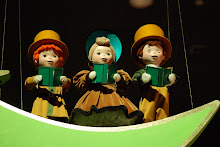中国酷不酷?是《金融时报》上的文章。文章从北京一系列酷劲十足的建筑——水母,鸟巢,水立方,大裤衩谈起。中心论点是:一个“酷”的中国应该是一个有风格感觉的地方,拥有为世界各地的年轻人争相效仿的本土品牌,还应该是一个创新活跃的自由之地。
随着奥运会的临近,奥运建筑也是一个热点话题。鸟巢,水立方的建成,无论你喜不喜欢他们,他们都在那里而且已经成了一个个建筑图标,北京新地标。我的朋友,在鸟巢的设计方瑞士Herzong & Meuron)工作的W3年前到北京玩时没有对鸟巢、水母,大裤衩说一句好话。最近虽也未说好话,但是转载了Herzong & Meuron关于鸟巢的电影宣传片。鸟巢已经是一个国际话题,建筑的,艺术的,体育的和平民的。电影宣传片可以在这里看:
http://www.herzogdemeuron-film.com/我个人也很难说很喜欢鸟巢,水母,大裤衩。但是建筑和一个城市精神是需要时间来砥砺的。也许,若干年后,它们就是巴黎的埃菲尔铁塔,卢浮宫前的金字塔。
转载几篇相关文章:
中国酷不酷?
作者:英国《金融时报》杰夫•代尔(Geoff Dyer)报道
2008年7月8日 星期二
无
神论的中国现在成了一种非常世俗的朝拜形式的目的地。来自世界各地的建筑师蜂拥而至,观赏——偶尔也会批评——北京拔地而起的宏伟新建筑。
其中一些建筑与奥运会有关——如蓝色“水泡”墙在暗夜中灼灼生辉的水立方(Water Cube)游泳中心;由于其联锁钢梁结构而被称为鸟巢(Bird's Nest)的国家体育场(National Stadium)。
但建筑热潮不仅仅与奥运有关。工人们正在进行中央电视台(CCTV)新楼的收尾工作。荷兰建筑师雷恩•库哈斯(Rem Koolhaas)设计的这座大楼是一项工程成就,把两座Z字形塔楼连在了一起——库哈斯的一位同事称之为“亲密接触时刻”(moment of intimacy)。(还不是很清楚该怎么形容它的北京人,给它起的礼貌绰号是“大裤衩”。我可不会告诉你那个粗鲁的绰号。)
尽管人们在谈论奥运会可能组织得多么好,建设工作的效率有多高,但在这个奥运年,关于北京建筑的各种议论,引出了另一个有趣的问题——中国现在“酷”吗?
这个问题并没有表面上看起来那么轻率,而是一个重要的商业、技术甚至是地缘政治问题。中国一再显示,它能够制造廉价可靠的产品。但一个“酷”的中国应该是一个有风格感觉的地方,拥有为世界各地的年轻人争相效仿的本土品牌,还应该是一个创新活跃的自由之地。
在一本关于李约瑟(Joseph Needham)的新书*中,西蒙•温彻斯特(Simon Winchester)趣味盎然地讲述了中国过去是怎样的一个科技超级大国的故事。李约瑟是一位剑桥(Cambridge)学者,一生大部分时间都在记录中国的科学成就。书末用一份长达10页的清单列举了中国的各项发明——李约瑟曾计算过,一个世纪有15个。许多人知道指南针、造纸和印刷术来自中国,但仅以字母“S”开头的条目就有37个,包括地震仪、水闸、钢铁生产以及李约瑟所称的“尿类固醇”。然后在15世纪左右,创新停止了——这就是西方人所称的“李约瑟之谜”(Needham question)。这些新标志性建筑的规划者所传递的隐含信息是:李约瑟之谜已经解决了,中国又回来了。
如今,人们无法逃脱中国精力充沛的雄心和复兴意识,从北京极其前卫的现代美术馆和枯燥乏味的音乐表演,到令人眩目的大学毕业生及专利审批统计数据。然而,最终结果似乎总与炒作内容不甚吻合。
奥运会产生的兴奋,应该令其成为中国公司向公众推销自己的完美契机,地方电视充满了赞美运动员实力的欢快广告。但很难想出有多少中国品牌真正抓住了国内公众的想象——更别说国外了。
许多人对李宁(Li-Ning)寄予厚望,这是一家由奥运会体操项目金牌得主创办的运动鞋公司。但在激情吸引力方面,它还是远远落后于行业巨擘耐克(Nike)和阿迪达斯(Adidas)——今年夏季,这两家公司的所有知名人物都会来到北京。李宁获取国际吸引力的尝试一直比较分散——它已经与沙克•奥尼尔(Shaquille O'Neal)达成了交易,但在奥运会时它还会赞助来自苏丹的队伍。
尽管研发支出数据非常惊人,但在中国要找到真正有创新力的公司仍然并不容易。很多事情妨碍了中国的科技干劲:没有经验的公司缺乏融资渠道、古板的国有企业占据主导地位、科技工作中注重数量甚于质量,以及学校中死记硬背的学习方式。还存在政治干扰。政府机构的控制欲影响到科学研究的基础,科研生活的重点偏向政治游说,而非同行评议。
开放社会也许充满了复杂、拖沓和政治作秀,但它们也善于创造和发明。尽管今天的中国充满了活力,但它仍是一个始终由党在背后控制的国家,从对互联网聊天室的监控,到公民社会的空间局限,再到对异议人士的骚扰——有时很琐碎,有时很恶劣。
在某种程度上,北京新建的偶像建筑讲述了一个类似的故事。那些建筑不是本土创造力的产物:它们由外国建筑师设计,其功能往往是展示国家实力。正如库哈斯的批评者所乐于指出的,他设计的央视大楼里的这个机构,其制作的节目有时只不过是党的宣传。
从环境到教育,中国未来几十年将会怎样,在很大程度上将取决于共产党以多快速度放开紧紧控制、允许社会自由呼吸。创新、文化以及中国式“酷”的诞生也是如此。这是未来的李约瑟们将会提出的问题。
WHY THE BOOM IS NOT BUILDING A COOL CHINA
By Geoff Dyer
Tuesday, July 08, 2008
Atheist
China is now the site for a very secular form of pilgrimage. Architects from around the world are thronging to Beijing to marvel – and occasionally snipe – at the epic new buildings springing up across the capital.
Some of these are related to the Olympics – the Water Cube swimming centre, whose blue, bubbled walls glow in the dark; and the National Stadium, known as the Bird's Nest because of its interlocking steel girders.
But the building boom is not just about the games. Workers are putting the final touches to the new Chinese Central Television tower, designed by Rem Koolhaas, the Dutch architect. The project is an engineering achievement that involves two Z-shaped towers that were joined together in what one of Mr Koolhaas's colleagues described as a “moment of intimacy”. (The polite nickname for the tower among Beijingers, who still do not quite know what to make of it, is “short trousers”. I will not tell you the rude one).
For all the talk about how well organised the games are likely to be and how efficient has been the construction, the buzz surrounding Beijing's buildings raises another interesting question in this Olympics year – is China now cool?
This is not as flippant as it may sound, but an important issue for business, technology and even geopolitics. China has repeatedly shown it can make cheap and reliable products. But a Cool China would be a place with a sense of style and home-grown brands young people the world over would want to emulate, and it would be a freewheeling place where innovation flourished.
The story of how China used to be a technology superpower is entertainingly told in a new book by Simon Winchester* about Joseph Needham, the Cambridge academic who spent much of his life chronicling its scientific achievements. At the end of the book is a 10-page list of Chinese inventions – 15 a century, Needham once calculated. Many people know the compass, paper and the printing press came from China but just under the letter “S” there are 37 items, including the seismograph, sluices, steel production and what he calls “Steroids, urinary”. Then some time around the 15th century, the creativity stopped – an issue known in the west as the “Needham question”. The implicit message from the planners of these new trophy buildings is that the Needham question has been resolved:China is back.
You cannot escape the restless ambition and sense of renewal in China these days, from the uber-fashionable modern-art galleries and grunge music scene in Beijing to the dizzying statistics about university graduates and patent approvals. Yet somehow the end result never quite matches the hype.
The excitement generated by the Olympics should make it the perfect time for Chinese companies to sell themselves to the public, and local television is full of snappy adverts extolling athletic prowess. But it is hard to think of too many Chinese brands that have really captured the imagination of the public at home – let alone abroad.
Many people had high hopes for Li Ning, a sports shoe company started by an Olympic gold-medal winning gymnast. Yet in terms of aspirational appeal, it is still running well behind industry giants Nike and Adidas, which will have all their big names in Beijing this summer. Li Ning's attempt to gain international appeal has been scatter-gun – it has signed a deal with Shaquille O'Neal but at the Olympics it will also be sponsoring the team from Sudan.
In spite of the raw numbers about research and development spending, it is still not easy to find genuinely innovative companies in China. The technology drive is hampered by lots of things – lack of finance for untried companies, the dominance of stodgy state-owned companies, a big emphasis on quantity over quality in scientific work and rote learning in schools. But there is also political meddling. The control freakery of the authorities reaches down into the basics of scientific research, with too much emphasis on political lobbying and too little peer review.
Open societies might be full of complications, delays and political grandstanding but they are also good at creativity and invention. For all the dynamism in China today, it is still a country where the dead hand of the party state is always in the background, from the monitoring of internet chatrooms to the limited space for civil society to the harassment – sometimes petty, sometimes nasty – of dissenters.
In a way, Beijing's new icons tell a similar story. The buildings are not the fruits of home-grown creativity: they are designed by foreign architects and their function is often expressing state power. As Mr Koolhaas's critics love to point out, his CCTV tower will house an organisation whose output is sometimes little more than party propaganda.
From the environment to education, so much of what happens in China over the next couple of decades will depend on how quickly the Communist party lets go its tight grip and allows society to breathe. The same goes for innovation, culture and the birth of Chinese cool. It is the question that future Needhams will be asking.
Planet Olympia 奥运建筑



